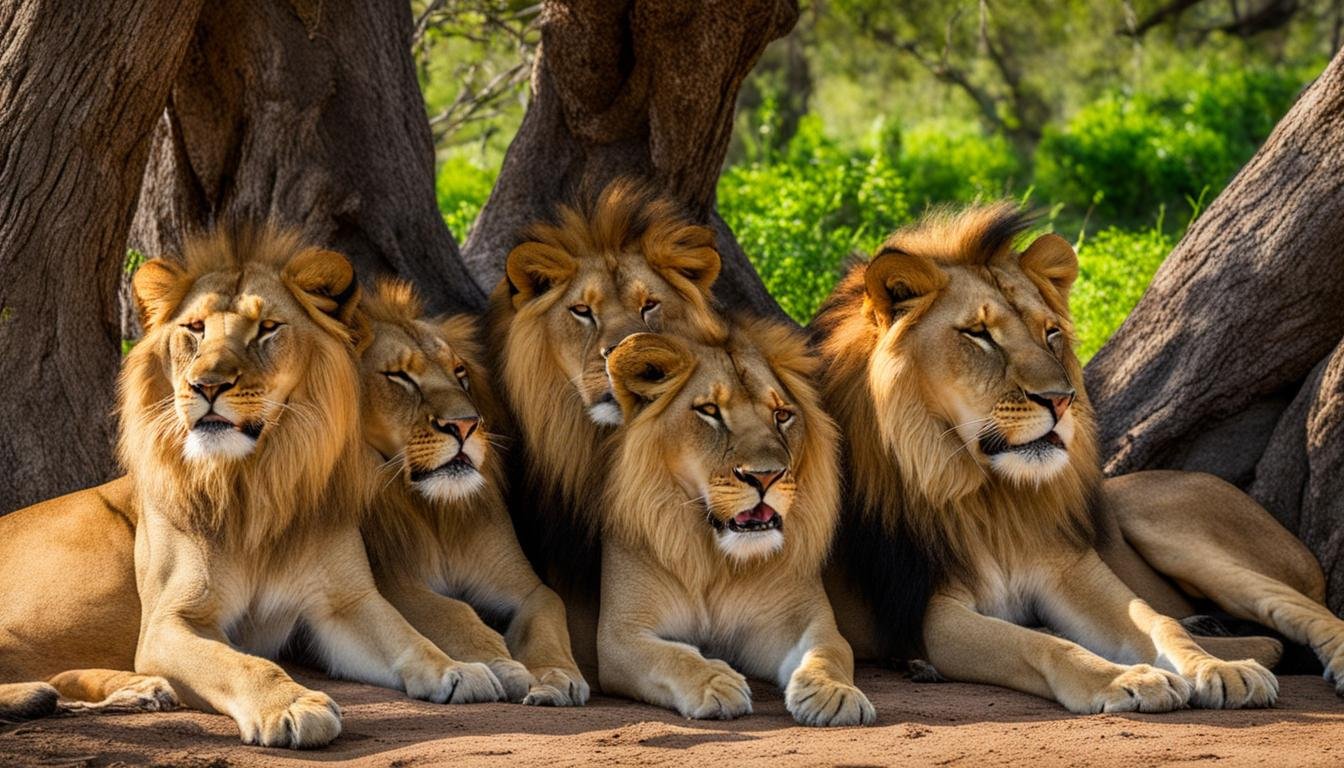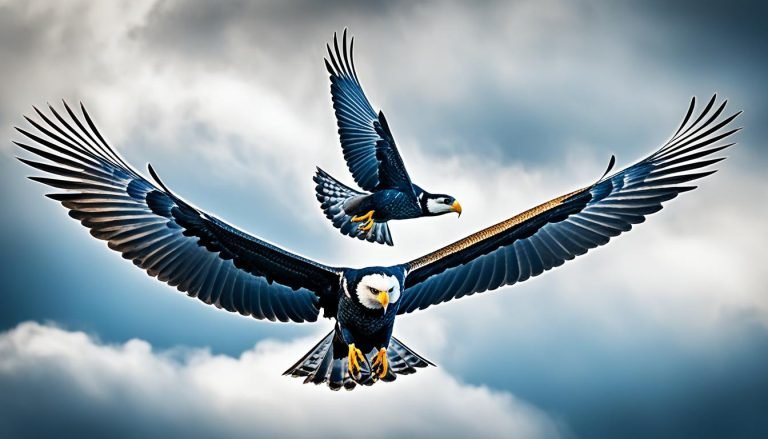What Do Lions Do All Day?
Key Takeaways:
- Lions have a structured daily routine that involves various activities.
- They are highly social animals and have a complex social structure within the pride.
- Lions are territorial animals and will defend their territories against intruders.
- They have unique reproductive behaviors and parental care systems.
- Lions have physical and behavioral adaptations that enable them to survive in different environments.
The Hunting Habits of Lions

Lions are apex predators known for their impressive hunting skills that have been perfected through evolution. These majestic creatures typically hunt at night-time, although they are capable of hunting during daylight hours as well.
They are opportunistic hunters and their prey varies depending on what is readily available in their territory. This includes large mammals such as zebras, buffaloes, and wildebeests.
Lions’ hunting style involves stealth, patience, and coordination within the pride. The lionesses do most of the hunting while the male lions protect the territory and cubs.
The lionesses work together to target the chosen prey, which is usually a medium-sized animal. They silently stalk their prey until they are close enough to pounce, often from a distance of fewer than 30 meters.
“It was absolutely incredible to witness the precision and teamwork involved in the lionesses hunting. They acted as one, like a well-oiled machine,” said wildlife photographer David Smith.
When lions hunt, they use a combination of techniques such as surprise attacks, ambushes, and chasing. One of the lionesses usually takes the lead in the hunt, while the others fan out around the target.
They then move in for the kill and take down their prey by leveraging the powerful force of their combined weight. The prey is killed quickly by a bite to the neck or the throat.
After the hunt, the lions take turns feeding on their prey. The lionesses and cubs get first dibs, while the male lions wait their turn.
In conclusion, the hunting habits of lions are a testament to their exceptional hunting skills that have evolved to make them formidable predators. Their hunting techniques and strategies are awe-inspiring, and their coordinated efforts within the pride make them successful hunters.
Social Interactions Among Lions: What Do Lions Do All Day?

Lions are known for their strong social bonds the pride. Lions live in prides, which consist of a group of lionesses, their cubs, and a few males. Each pride has an established hierarchy, with the dominant male holding a high rank.
Lions communicate with each other through vocalizations and body language. They use a range of vocalizations, such as roars, grunts, and snarls, to convey their emotions, including aggression, fear, and contentment. Lions also use scent markings to establish their territory and communicate with other lions.
When it comes to hunting, lions work together as a team, pursuing large prey such as buffaloes and zebras. Females are usually the primary hunters, and they hunt in groups to increase their chances of success. The males typically protect the pride and the cubs, although they may occasionally help with hunting.
Lions form strong bonds with other members of the pride, often grooming and sleeping together. These interactions help to maintain social cohesion within the group.
When new males join a pride, they may engage in aggressive or hostile behavior toward the existing members. However, over time, they may form alliances and become close associates.
“In a pride, lions are cooperative, and they can form strong bonds with other members. Females usually do most of the hunting, while males protect the pride and the cubs. Communication is key to maintain social cohesion, and lions use a range of vocalizations and scent marking to communicate with each other.”
Lion Social Structure
Lions have a unique social structure that revolves around the pride. Within the pride, lionesses typically share a strong bond, and they work together to raise and protect the cubs. The dominant male holds the highest rank and is responsible for mating with the females. The other males in the pride may be related to the dominant male, but they are usually ousted from the pride when they reach maturity.
Lion Communication Methods
Lions have a wide range of vocalizations that they use to communicate with other members of the pride. They can use these sounds to convey a range of emotions, including aggression, fear, and contentment. Lions also use scent markings to establish their territory and communicate with other lions.
Forming Strong Bonds
Lions form strong bonds with other members of the pride, often engaging in social grooming and sleeping together. These interactions help to maintain social cohesion within the group and strengthen the bonds between pride members.
Establishing and Defending Territories

Lions are highly territorial animals that seek to establish and defend their domains. Their territories are used for various activities, including feeding, mating, and raising their young. Lions mark their territories in several ways, including:
- Scent marking: Lions use their urine, feces, and anal gland secretions to mark their territory. This helps them establish their presence and communicate with other lions in the area.
- Scratching: Lions use their claws to scratch tree trunks and other surfaces to mark their territories visually.
- Roaring: Lions roar to announce their presence and warn other lions to stay away.
By maintaining their territories, lions can ensure that they have access to food and water sources, protect their cubs from predators, and increase their chances of mating successfully.
Lions will defend their territories fiercely, often engaging in battles with rival males. These battles can be incredibly violent and can result in serious injuries or death.
“A lion is called a ‘king of beasts’ obviously for a reason. They are fierce, powerful animals that command respect in their habitats.”
The Importance of Maintaining Lion Territories
Maintaining lion territories is crucial for the survival of the species. Lions require vast territories to hunt, mate, and raise their young.
Human activity, such as habitat destruction and poaching, has threatened these habitats and put lion populations at risk. It is essential to protect lion territories to ensure the long-term survival of these majestic animals.
The Daily Routine of Lions

Lions are known for their structured daily routine that primarily revolves around their survival needs. A typical day in the life of a lion involves various activities, including hunting, sleeping, grooming, and socializing.
Sleeping patterns
Lions sleep for an average of 16-20 hours a day, making them one of the laziest big cats in the animal kingdom. Their sleeping patterns are generally divided into several short naps, with periods of activity in between, primarily at dawn and dusk.
Grooming habits
Lions are known for their impeccable grooming habits, spending up to an hour a day licking and cleaning their fur. This behavior is not only crucial for maintaining their hygiene but also helps strengthen social bonds within the pride.
Interactions with other pride members
In the wild, lions typically live in groups called prides. These prides usually consist of multiple lionesses, their cubs, and a few male lions. Interactions within the pride may vary based on the individuals’ social status, with males occasionally engaging in playful sparring and females taking on the bulk of the hunting responsibilities.
Other activities
Aside from sleeping, grooming, and socializing, lions also spend a significant amount of time hunting. They hunt primarily at night and tend to work together to take down larger prey. Depending on availability, they may hunt anything from gazelles to buffaloes.
In conclusion, the daily routine of lions involves various activities, with the bulk of their time spent sleeping and hunting. Their highly structured routine allows them to survive and thrive in their natural habitat, making them one of the most fascinating animals on the planet.
Reproduction and Parental Care among Lions
Lions have a unique social system that influences their mating and parenting behaviors. Males establish dominance and control a pride of females, with whom they mate primarily during the female’s estrus cycle. This period can last for four to seven days, and it usually happens once every two years.
During mating, the male deterrents other males from approaching the female by roaring, fighting, and sometimes killing a potential mate. After the mating, the male leaves the females to seek another pride of females. The gestation period lasts for around 110 days, after which the female gives birth to a litter of one to six cubs.
The role of males in parenting is crucial for lion survival. Males protect the territory and defend it against intruders and other predators while also providing prey to the family. Meanwhile, females are responsible for cub rearing, grooming, and nursing. Cubs are nursed for six to eight months before being introduced to solid foods.
Environmental Adaptations of Lions
Lions have adapted to survive in a wide range of environments, from the savannahs of Africa to the dense forests of India. Their physical and behavioral adaptations have allowed them to not only survive but thrive in these various habitats.
Physical Adaptations
One of the most notable physical adaptations of lions is their muscular build and sharp teeth and claws, which make them effective predators. Their tawny fur and dark manes also provide them with optimal camouflage in their natural habitats. Additionally, lions have excellent eyesight and hearing, which are indispensable for hunting and keeping watch over their territories.
Behavioral Adaptations
Lions have developed various behavioral adaptations to survive in different environments. For example, in areas with limited water sources, lions have evolved to rely on the moisture from their prey to meet their hydration needs.
They also have different hunting techniques depending on their habitat and the type of prey available. For instance, lions in grasslands use their camouflage to sneak up on their prey, while those in wooded areas may hunt in packs to bring down larger prey.
The Importance of Adaptations
The adaptations of lions are crucial to their survival in the wild and illustrate the resiliency of these magnificent animals in the face of changing environments. However, with habitat destruction and other threats, their ability to adapt may be tested in the coming years.
Interactions with Other Wildlife
Lions do not live in isolation; they share their habitat with several other wild animal species. Understanding their interactions with other wildlife can provide insights into their role in the ecosystem and how they adapt to their environment.
Lion Prey Interactions
Lions are iconic predators, and their hunting activities play an essential role in shaping the ecosystem. As apex predators, they help regulate the population of herbivores such as buffalo, zebras, and wildebeest. Their hunting activities are highly coordinated and involve strategic planning, teamwork, and sometimes stalking.
Lions have powerful jaws, sharp teeth, and claws, which they use to bring down their prey. Their interactions with prey species are essential for the maintenance of the ecosystem and the survival of both predator and prey.
Competitors and Threats
Lions also face competition from other predators such as leopards and hyenas, with whom they share territories. Conflict can arise when these predators compete for resources such as food and water.
Additionally, humans can pose a significant threat to lions, mainly when they encroach on lion territories and disrupt their natural activities. As human populations expand, lion habitats are reduced, leading to a decline in their numbers and a loss of their ecological role.
The Importance of Protecting Lion Activities
Given the importance of the lion’s role in maintaining the ecosystem and their interactions with other wildlife, it is essential to protect them from threats such as human encroachment, habitat loss, and poaching.
Conservation efforts such as wildlife reserves, habitat restoration, and anti-poaching measures can help protect lions and preserve their activities and role in the ecosystem. By taking measures to conserve these magnificent creatures, we can ensure their survival and the health of the ecosystem they call home.
Human-Lion Conflicts and Conservation Efforts
Lions are magnificent creatures facing numerous challenges such as habitat loss and human-lion conflicts. As human populations increase and expand into natural areas, the likelihood of conflict between humans and lions also increases. Lion activities that occur near human settlements and agricultural lands often result in retaliatory killings, which threaten the species’ future survival.
Conservation efforts are essential in preserving lion populations, and many organizations are working towards this goal. Examples of these lion conservation organizations include the African Lion and Environmental Research Trust (ALERT) and the Lion Recovery Fund.
These organizations are committed to creating awareness about lion conservation, protecting lion habitats, and implementing anti-poaching measures to prevent illegal hunting and poaching of lions.
Human-Lion Conflict Mitigation Strategies
To prevent human-lion conflicts, various strategies have been implemented. One of these strategies is the installation of predator-proof bomas, which are enclosed areas that protect livestock from lion attacks.
Additionally, some conservationists work closely with communities in lion-populated areas, educating them on how to live in harmony with the lions, identifying ways to mitigate risks, and managing unsustainable hunting practices.
Conservation Efforts to Save Lion Populations
Efforts to protect lions are critical in ensuring viable populations of these magnificent creatures are preserved for future generations. Conservation organizations work tirelessly to address the various challenges facing these animals, including habitat loss, unsustainable hunting, and human-wildlife conflicts.
With support from governments, communities, and individuals worldwide, we can ensure that lion populations continue to thrive.
The Future of Lions
Lions are facing numerous challenges in the modern world, including habitat loss, human-lion conflicts, and poaching. These challenges have not only led to a decline in their population but have also put their future at risk. It is crucial to take immediate action to conserve and protect these majestic creatures for future generations.
Conservation efforts are being made to protect lions and their habitats. Various conservation organizations are working towards creating awareness and educating local communities about the importance of conserving lions.
They are also taking steps to mitigate human-lion conflicts and reduce habitat loss by creating protected areas for lions to thrive.
Individuals can also contribute to lion conservation efforts by supporting organizations working towards their conservation, avoiding products made from lion parts, and promoting eco-tourism. It is essential to recognize the value of lions to our ecosystem and the importance of protecting them.
The future of lions depends on the actions we take today. It is up to us to ensure that these incredible creatures continue to roam the wild and maintain their critical role in the ecosystem.







